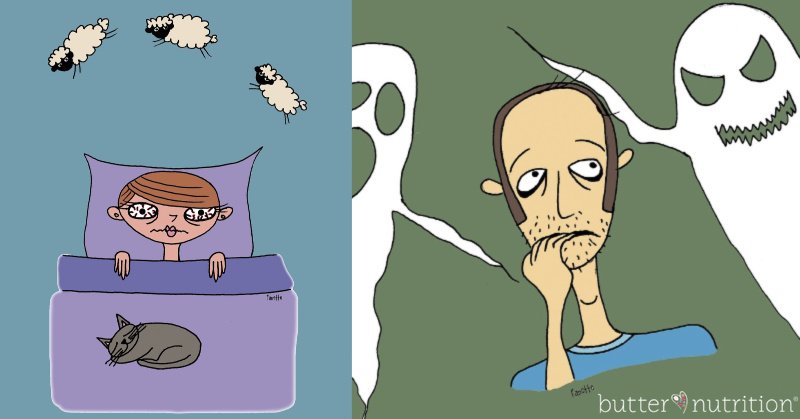
About 13 years ago I had a brief encounter with insomnia. It was an awful, staring at the ceiling, couldn't fall asleep kind of feeling that you just never quite forget. Within a week or so of the insomnia symptoms, my research ensued and a calcium deficiency was among the first to come on my radar. Calcium made a lot of sense at the time, because my diet was fairly low in calcium. Within a day or two of upping my calcium intake, the insomnia vanished.
The point of my story is how different this could have gone. I could have gone to a traditional doctor who would have likely dismissed diet and nutrition, and gone straight to recommending a prescription medication to help me sleep. The Rx medication could have created side effects and other problems within my body, and my calcium deficiency could have just gotten worse over time...
Now 13 years later, with the help of hair analysis, I can keep my calcium levels right where I want them and avoid the calcium dips that can trigger symptoms, like insomnia, anxiety, and blood sugar issues.
Signs of Low Calcium
The following symptoms have been linked to calcium deficiency and could be clues that you're just not getting enough:
- insomnia
- anxiety
- poor blood sugar regulation
- PMS
- osteoporosis and osteopenia
- depression
- muscle cramps and spasms
- dental problems
Of course, there are other reasons your calcium can be low like kidney disease, excess vitamin A in the diet from food and/or supplements (super common), magnesium deficiency, and low vitamin D levels. That's why it's important to investigate the situation and discover exactly how your body needs to be supported with data.
Role of Calcium
Calcium has many important roles in the body. It's the most abundant mineral in the human body and the vast majority of calcium is found in the bones and teeth. A much smaller amount (around 1%) is found in the blood and soft tissues. Calcium is such an important mineral in the human body that when intake it too low, demineralization of bone begins to make calcium available to maintain normal blood calcium concentrations.
So how does this play in the body? Well, when blood calcium levels decrease (from lack of dietary calcium), it triggers parathyroid hormone or PTH (which controls calcium metabolism in the body) to break down bone to buffer the pH of the blood. This increases stress, and is an inflammatory process that can play a role insomnia and other symptoms.
According to Dr. Dr. Ray Peat, PhD, parathyroid hormone (PTH) is an important regulator of calcium metabolism. If dietary calcium isn't sufficient, causing blood calcium to decrease, the PTH increases, and removes calcium from bones to maintain a normal amount in the blood. PTH has many other effects, contributing to inflammation, calcification of soft tissues, and decreased respiratory energy production."
How to get more in your diet?
The Recommended Dietary Allowance (RDA) for calcium is 1,000-1,200 mg.
Boost your intake with the following calcium-rich foods:
- Sardines w/the bones (3.2oz): 346.54mg
- Whole Milk (1 cup): 276mg
- Sesame Seeds (¼ cup): 351mg
- Whole Milk Yogurt (1 cup): 296mg
- Cheese (1oz): 202mg
- Nettle Infusion (1 cup): 250mg
- Collard Greens (1 cup): 267.90mg
- Whole Milk Mozzarella Cheese (1oz): 141mg
Supplements for calcium deficiency?
I'm pretty insistent on making sure one knows their calcium status before taking a calcium supplement, and only if food sources aren't doing the job. I prefer hair analysis testing to access calcium status. The reason for this is that excess calcium is a real problem, and it is more common than calcium deficiency (in my office at least).
The other concern with calcium supplementation is often the co-factors are not included such as magnesium, silica, boron, and vitamin K2 that you get when you eat calcium from food sources.
Typically calcium levels won't get too high on their own from food alone. It's when a calcium-rich diet is paired with calcium supplements and/or vitamin D3 supplements that calcium levels start creeping up. Soaring calcium levels can lead to calcification of your body. Think stiffness among other undesirable things, like back pain, joint issues, and osteoporosis.
A better bet for strong bones? Get some food-sourced calcium in your diet along with magnesium K2, silica, and boron (if you know you're low in these). And don't forget about the benefits of weight-bearing exercise for maintaining bone health.
My translation here should be no surprise: there is no shortcut to health. Real food is always the safest supplement.
Testing for calcium deficiency
My favorite way to assess your own calcium level is by completing a hair analysis. It's a non-invasive test that can give you so much information about your mineral levels and how you can go about balancing them for optimal nutrition!
If your levels come back low, I typically like to check vitamin A/retinol levels through a simple blood test (available to all US clients, except NY, NJ and RI). This is because excess vitamin A can deplete calcium.
Ready to find out your calcium level?
Get started right away here or enter your email below to learn all about the best way to understand your own mineral levels with hair analysis.
Are your calcium levels falling short? Please share in the comments!
PIN IT:
References:
https://lpi.oregonstate.edu/mic/minerals/calcium
https://www.ncbi.nlm.nih.gov/pmc/articles/PMC3542443/
http://www.whfoods.com/genpage.php?tname=nutrient&dbid=45
https://nutritiondata.self.com/
Images by Stephanie Ghesquier from Pixabay








Si says
Catherine,
Are you familiar with Morley Robbins? If so, what do you think of his protocols?
Catherine says
Agree with some parts, don't agree with others.
Abundantly,
Catherine
SP says
Unfortunately in Canada all milk is fortified with vitamin D3. Even organic grass fed whole milk. I grew up elsewhere though and drank a lot of milk as a child, but somehow became influenced by all the anti milk messaging and stop drinking milk and most other dairy products as well. I recently started to have intense cravings for milk, and despite my fears, started drinking it. The more I drink, the more I seem to want. These days, it's all I want, nothing else appeals. I can easily consume a liter every day. I'm trying to trust these cravings.
Sue says
Could you tell me which parts you agree with? I suffer from bad fatigue and am trying to fix myself as I have not had luck with doctors. I have read Dr. Walsh also - on copper toxicity - as I suffer from anxiety and depression also. They seem to have different opinions about zinc and copper , and I thought maybe a third opinion would help. I cannot donate blood as Morley recommends. either. Thanks for your reply and your great information.
I have also read Garret Smith's ideas about vitamin a, as Morley favors vitamin a to reduce iron? Alot of great ideas, but I am just more confused.
Mirna says
If calcium is too high on a hair test, does this indicate a calcium shell issue?